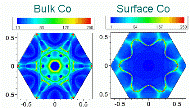Department of Physics and Astronomy: Publications and Other Research

Gordon Gallup Publications
Document Type
Article
Date of this Version
4-6-2000
Abstract
The vibrational and rotational state dependence of dissociative attachment (DA) in low-energy e-H2 and e-HF collisions is studied within the framework of nonlocal resonance theory. The dynamics of nuclear motion in the nonlocal complex potential is treated by the quasiclassical approach. The resonance energy, width function, and level-shift function are taken from our previous calculations based on the projection operator formalism. Results for all vibrational states up to the dissociative attachment thresholds and selected rotational states are presented. Our cross sections for H2 exhibit a plateau structure in the energy range above the dissociation threshold, and this structure gets more pronounced with higher v or J. The dissociative attachment cross section for vibrationally and rotationally hot HF (T=1150 K) agrees well with available experimental data. For H2 in thermal equilibrium at 1400 K, the agreement between experiment and theory is less satisfactory.


Comments
Published by American Physical Society. Phys. Rev. A 61, 052705 (2000). http://pra.aps.org. Copyright © 2000 American Physical Society. Permission to use.